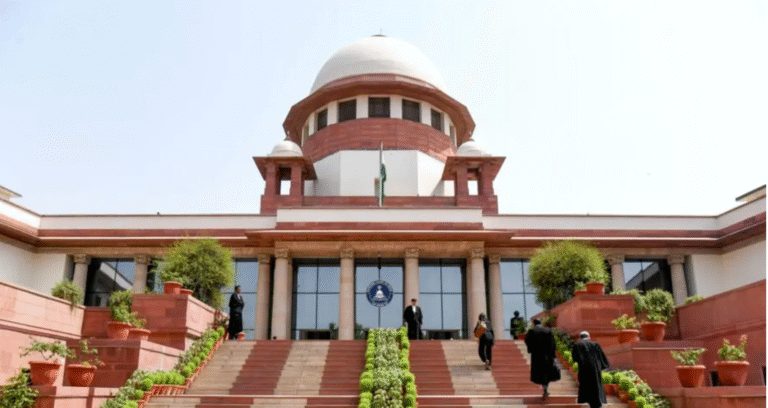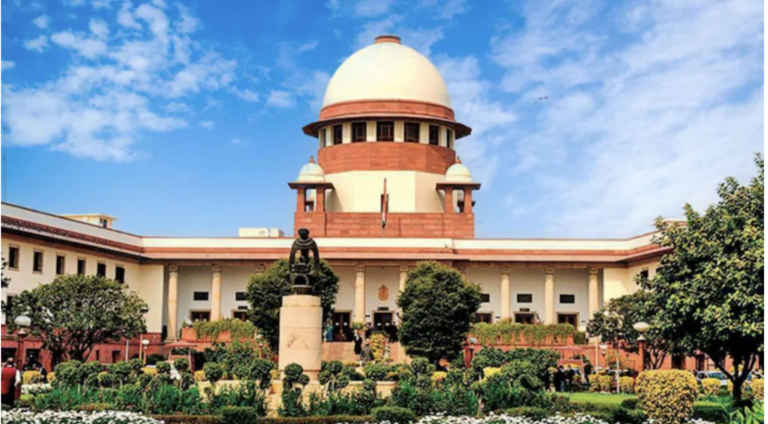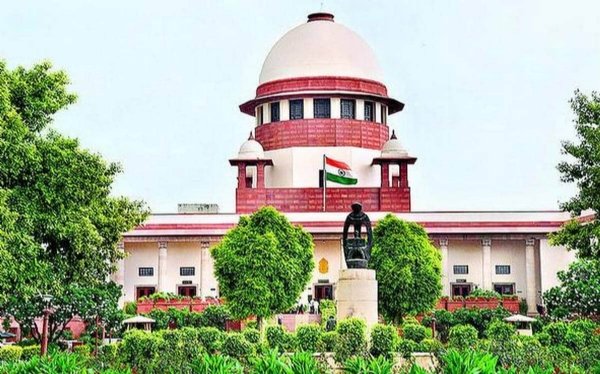A three-Judge Bench of the Supreme Court, headed by Chief Justice Bhushan Gavai, has issued an exceptionally strong and unprecedented caution to Judges of the Supreme Court itself, stressing that they must remain vigilant, careful, and disciplined, and must avoid passing orders that contradict binding precedents.

The Court warned that such contradictions not only encourage chance litigation but also bring serious disrepute to the justice-delivery system.
In VANASHAKTI, 2025 INSC 1326, the three-Judge Bench recalled and set aside the judgment delivered by a two-Judge Bench led by Justice A.S. Oka, observing that the smaller Bench had ignored binding coordinate-Bench decisions—an error that amounts to a grave breach of judicial discipline.
The Indian Bar Association has welcomed the ruling, expressing hope that such strong judicial reminders will reduce instances of injustice and prevent situations where justice appears to vary according to the changing moods of individual judges.
Well-settled legal position
The Supreme Court has long held that:
A two-Judge Bench must comply with the directions of a three-Judge Bench, and failure to do so amounts to contempt of the Supreme Court.
— Subrata Roy Sahara v. Union of India, (2014) 8 SCC 470.
High Court Judges who refuse to follow binding Supreme Court precedents also commit contempt of court.
— Rabindra Nath Singh v. Rajesh Ranjan @ Pappu Yadav, (2010) 6 SCC 417;
— Spencer & Co. Ltd. v. Vishwadarshan Distributors (P) Ltd., (1995) 1 SCC 259.
This principle has now been powerfully reaffirmed in VANASHAKTI, 2025 INSC 1326, where a three-Judge Bench set aside a two-Judge Bench ruling that had ignored earlier co-equal Bench decisions. The Court reiterated the doctrine laid down in:
Official Liquidator v. Dayanand, (2008) 10 SCC 1; and
Bajaj Allianz General Insurance Co. Ltd. v. Rambha Devi, (2025) 3 SCC 95
that the tendency of some Judges to avoid binding precedents by pointing out minor or trivial factual distinctions is wholly impermissible. Such conduct reflects disrespect to the constitutional ethos and constitutes a serious breach of judicial discipline.
A warning on credibility and chance litigation
The Court observed that deviations of this kind:
seriously undermine the credibility of the judicial institution,
disrupt the uniform development of law, and
promote chance litigation—directly harming the rule of law.
The Bench noted that predictability and certainty are the hallmarks of Indian judicial jurisprudence evolved over the last six decades. Conflicting judgments of superior courts cause incalculable harm, generating uncertainty and confusion among litigants, lawyers, and authorities alike.
CONSTITUTIONAL RESPONSIBILITY OF JUDGES:- The judgment underscores that those entrusted with administering the judicial system—and who take an oath to uphold the Constitution—must exemplify the highest commitment to constitutional principles and judicial discipline. This burden is especially weighty for Judges, who wield the power to decide critical constitutional and legal issues and who serve as guardians of individual and societal rights.
A constitutional reminder from the Supreme Court
“Discipline is the sine qua non for the effective and efficient functioning of the judicial system. If Courts command others to follow the Constitution and the rule of law, they cannot themselves violate constitutional discipline.”
It is further ruled that Judges owe an institutional duty to uphold the certainty, stability, and predictability of law. Judicial decisions must therefore be anchored in established legal principles, and courts are expected to justify their conclusions by applying the settled doctrines laid down by binding precedent.
The doctrine of stare decisis is a foundational pillar of the Indian judicial system. It ensures uniformity, consistency, and coherence in the development of legal principles. A consistent body of judicial precedent reinforces public confidence in the justice-delivery system and preserves the rule of law.
Accordingly, the Supreme Court has emphasized that there must be consistency in the annunciation of legal principles in its decisions, and that judicial discipline demands faithful adherence to binding precedent. Any deviation not only disrupts the harmony of legal doctrine but also undermines the credibility of the institution and the certainty expected by litigants and the public at large.
It is a settled principle of law that a decision rendered by a co-ordinate Bench is binding on subsequent Benches of equal or lesser strength. No Bench of the same strength can overrule or disregard a co-ordinate Bench decision; at best, it may refer the matter to a larger Bench if it disagrees.
Thus, any decision rendered in ignorance of a prior binding judgment of the same Court, or of a Court of coordinate or higher jurisdiction, or in ignorance of a statutory provision or a rule having the force of law, is classified as per incuriam. A per incuriam ruling carries no precedential authority. Such a decision cannot be regarded as laying down “good law,” even if it has not been expressly overruled.
A decision rendered per incuriam loses all precedential value. Such a ruling is not binding as a judicial precedent. All the authorities are fully entitled to disagree with and decline to follow a per incuriam decision, and a larger Bench can expressly overrule it.
ACTION PROVIDED AGAINST JUDGES REFUSING TO FOLLOW THE BINDING PRECEDENTS
The law is unequivocally settled by larger Benches of the Supreme Court, including several Constitution Benches, that Judges who neglect, omit, or refuse to apply the law and ratio laid down by the Supreme Court betray the constitutional trust reposed in them by the nation. Every Judge is duty-bound to consider the binding precedents relied upon by the parties, identify and examine the ratio decidendi, and—if inclined to take a different view—assign cogent, reasoned, and intelligible grounds for non-acceptance.
Mechanical or “rubber-stamp” reasons, superficial observations, pretence of consideration, or pretence of reasons or mere name-sake reference to binding precedents—followed by a contrary view based on minor, artificial, or irrelevant factual distinctions—do not satisfy this constitutional obligation. Such conduct has been expressly held to constitute judicial adventurism, perversity, dishonesty, and even contempt of the Supreme Court.
It is also firmly settled that when a Judge proposes to rely upon any judgment, ratio, or legal proposition suo motu—that is, not cited by the parties—the Court is constitutionally and procedurally bound to give the parties and their advocates a fair opportunity to address, explain, or rebut the said legal position.
Failure to afford such an opportunity renders the decision vitiated, being in violation of the principles of natural justice, including the fundamental rule of audi alteram partem.
Such an order becomes liable to be recalled, reviewed, or set aside, as reliance on an uncited or undisclosed authority without hearing the parties constitutes a denial of fair hearing and an abuse of judicial process.
Where this mandatory procedure is not followed, the Judge’s deliberate disregard of binding precedent amounts to a breach of the judicial oath, a violation of Articles 141 and 144 of the Constitution, and a serious disservice to the judicial institution and to the litigants for whose benefit the system exists. Such conduct brings disrepute upon the entire judiciary and strikes at the very foundation of the administration of justice.
The Supreme Court has repeatedly emphasized that judicial authority is not a personal prerogative but a constitutional trust, to be exercised strictly within the framework of Articles 141 and 144 of the Constitution, which mandate every court and every authority to act in conformity with the law declared by the Supreme Court and to aid its enforcement.
It is firmly settled that Judges who pass orders contrary to binding precedents are liable for both contempt proceedings and departmental disciplinary action. Judges are bound to apply the correct law and must not pass orders contrary to binding precedents even if such precedents are not cited by the parties.
A Judge who passes an order in disregard of even general guidelines issued by the Supreme Court is equally guilty of contempt. A Judge cannot take the defence that he or she was unaware of binding precedents or directions of the Supreme Court; ignorance of the law is no defence even for a judicial officer.
Such conduct has been judicially characterized as:
“judicial adventurism”
“acting with corrupt motive”
“legal malice”
“perversity”
“judicial dishonesty”
“fraud on power”
“misuse of discretion”
Departmental actions—including suspension, dismissal, and compulsory retirement—have been repeatedly upheld on this ground, with courts observing that a Judge’s poor understanding of law or improper conduct has a “rippling effect” on the entire judicial system and gravely harms litigants.
In numerous cases, criminal prosecution has been directed against Judges who have misused judicial power to confer illegal benefits upon undeserving individuals through corrupt or improper means. The Indian Penal Code contains specific penal provisions applicable to dishonest or corrupt Judges who wilfully defy the mandates of law and pass unlawful, mala fide, or jurisdictionally perverse orders.
Importantly, such criminal proceedings are maintainable irrespective of whether the impugned judicial order is challenged separately or not, as both remedies operate in distinct and independent legal spheres.
The relevant penal provisions attracted against Judges passing orders contrary to law include:
Sections 166, 167, 192, 193, 218, 219, 220, 465, 466, 409, 120B, 34, 109 IPC,
along with their corresponding provisions under the Bharatiya Nyaya Sanhita (BNS).
Further, any misuse or abuse of judicial authority to extend an “undue favour” to an accused or any other person squarely invites Section 7A of the Prevention of Corruption (Amendment) Act, 2018, which penalizes any person who obtains or attempts to obtain an “undue advantage” for themselves or for another, through corrupt or illegal means, or by using personal influence to improperly influence the performance of a public servant’s official duty. The statutory punishment is imprisonment for not less than three years, extendable up to seven years, along with a fine.
Ratilal Parmar v. State of Gujarat, 2024 SCC OnLine SC 298,
Rohan Vijay Nahar Vs. State 2025 SCC OnLine SC 2366,
State Bank of Travancore v. Mathew K.C., (2018) 3 SCC 85 ;
Harish Arora vs The Dy. Registrar 2025 SCC On Line Bom 2853;
Union of India v. K.S. Subramanian, (1976) 3 SCC 677
Pradip J. Mehta v. CIT, (2008) 14 SCC 283
Dattani and Co. v. Income Tax Officer, 2013 SCC OnLine Guj 8841
Yogesh Waman Athavale v. Vikram Abasaheb Jadhav, 2020 SCC OnLine Bom 3443
Official Liquidator Vs. Dayanand (2008) 10 SCC 1
U.P. Education for All Project Board v. Saroj Maurya, (2024) 12 SCC 609
Neeharika Infrastructure (P) Ltd. v. State of Maharashtra, (2021) 19 SCC 401
Emkay Exports, Mumbai v. Madhusudan Shrikrishna, 2008 SCC OnLine Bom 598
Bank of Rajasthan Ltd. v. Shyam Sunder Tap Aria, 2006 SCC OnLine Bom 755
R.R. Parekh Vs. High Court of Gujrat (2016) 14 SCC 1,
Vijay Shekhar v. Union of India, (2004) 4 SCC 666,
Umesh Chandra Vs State of Uttar Pradesh & Ors. 2006 (5) AWC 4519 ALL;
K. Veeraswami Vs. Union of India (1991) 3 SCC 655 (Five-J);
Raman Lal Vs. State 2001 Cri. L. J. 800;
Re: C. S. Karnan (2017) 7 SCC 1;
Govind Mehta Vs. State of Bihar (1971) 3 SCC 329,
Mohd. Nazer M.P. v. State (UT of Lakshadweep), 2022 SCC OnLine Ker 7434,
Jagat Jagdishchandra Patel Vs. State of Gujrat 2016 SCC OnLine Guj 4517;
K. Rama Reddy Vs State 1998 (3) ALD 305,
On reasoned order :-
Neeharika Infrastructure Pvt. Ltd. v. State of Maharashtra, 2021 SCC OnLine SC 315;
Vishal Ashwin Patel v. CIT, (2022) 14 SCC 817;
Shailesh Bhansali v. Alok Dhir, 2025 SCC OnLine SC 512;
Hakim Nazir Ahmad v. Commissioner, 2025 SCC OnLine J&K ___,
Johra v. State of Haryan a, (2019) 2 SCC 324;
U.P. Education for All Project Board v. Saroj Maurya, (2024) 12 SCC 609;
P. Radhakrishnan & Anr. v. Cochin Devaswom Board & Ors., 2025 INSC 1183;
Delta Foundations v. KSCC Ltd., (2003) 4 ICC 251 (Ker) (DB)
Supporters of Justice A.S. Oka have described the recent judicial development as an act of “revenge” by CJI Bhushan Gavai, citing Justice Oka’s recent interview in which he openly criticised the CJI for elevating his own nephew as a High Court Judge, calling it a direct conflict of interest.
However, legal experts associated with the Indian Bar Association have firmly rejected this narrative. They state that the ruling delivered by CJI Gavai is legally correct, constitutionally sound, and fully consistent with binding Constitution Bench precedents. According to them, concerns regarding Justice Oka’s judicial conduct long predate the current controversy.
They note that despite Justice Oka portraying himself as a champion of transparency, his judicial record has been marred by serious allegations — including passing orders contrary to binding Supreme Court precedents, encouraging corruption, and promoting dishonest or frivolous litigation during his tenure at the Bombay High Court.
Serious concerns had earlier arisen in cases involving the Anna Hazare matter, Section 340 CrPC perjury proceedings, and other matters.
Members of the Indian Bar Association have stated that they now intend to initiate appropriate criminal proceedings against Justice Abhay Oka for alleged fraud, judicial dishonesty, and promoting corrupt lit
igation practices, strictly in accordance with law and binding Supreme Court jurisprudence.



